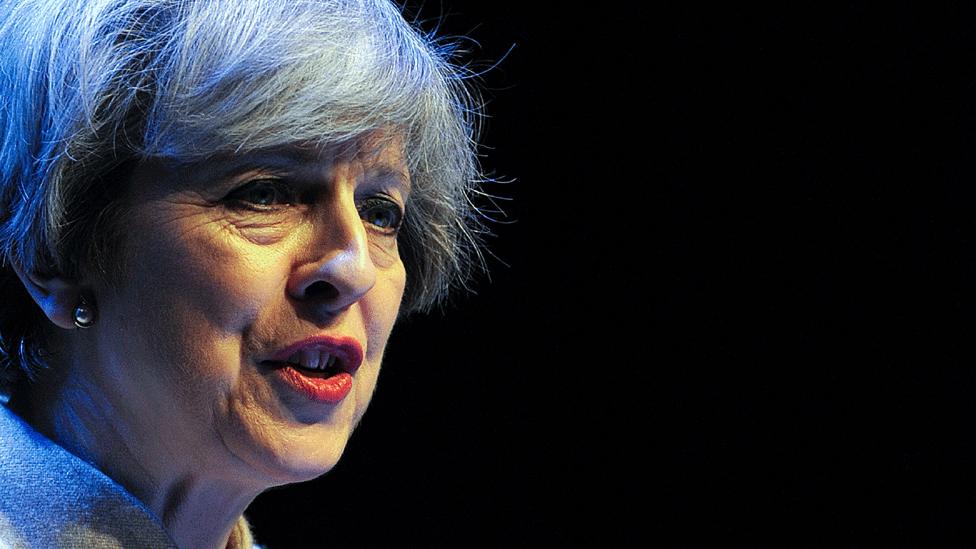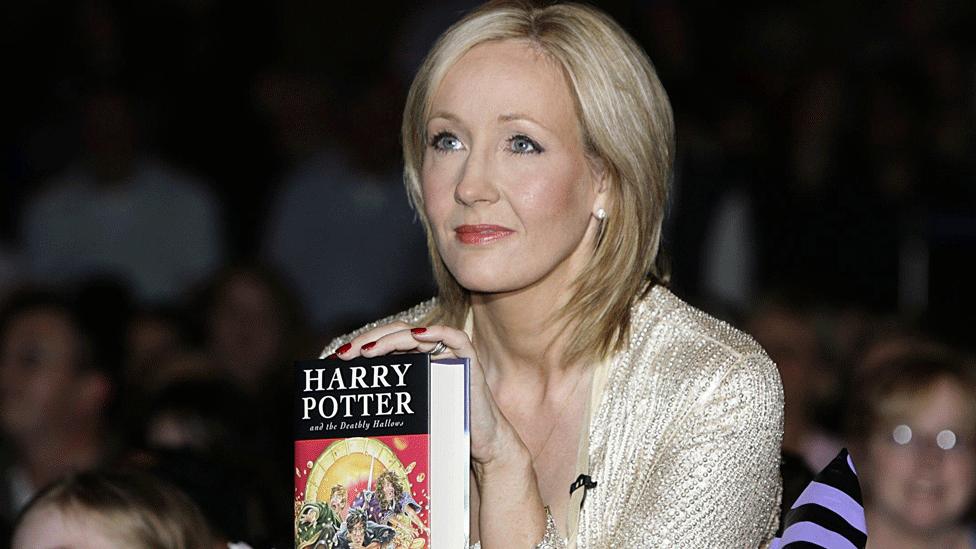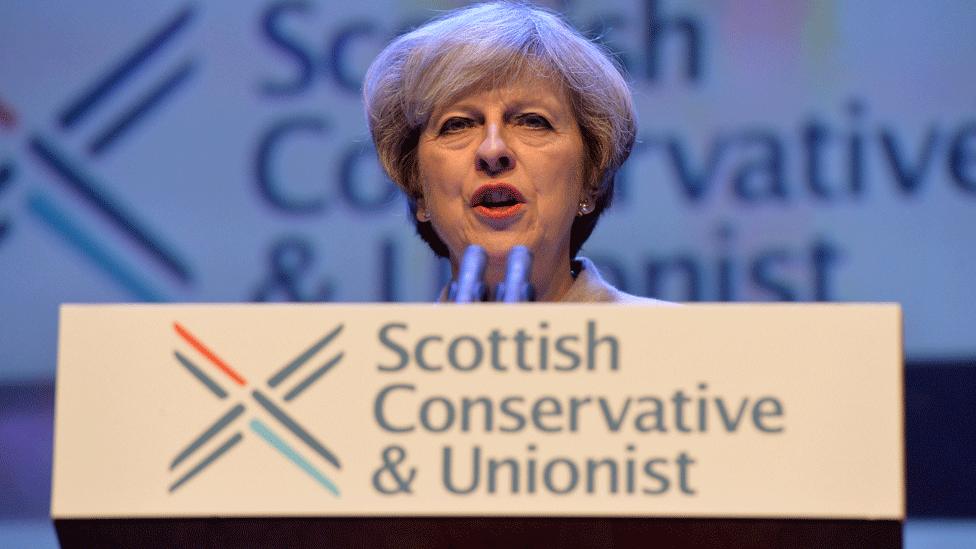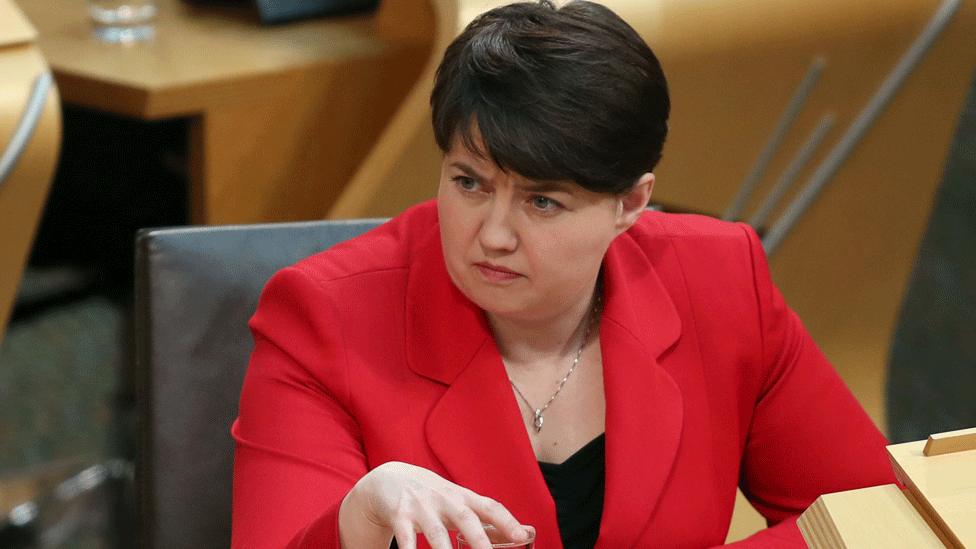PM's argument for more union in the United Kingdom
- Published

Theresa May spoke of a union of family, of shared endeavour and of common interest
It was a very different Prime Ministerial speech. Gone, mostly, were the seven-word sentences to which we became accustomed in the past. Gone too the accumulation of soundbites, each demanding an ecstatic ovation.
Indeed, instead of punching up the applause lines, Theresa May looked slightly surprised when the audience clapped. A little like a modest but eager archaeology lecturer, testing a new theory about Pictish finds.
There were other surprising cameo elements too. She listed the proclaimed characteristics of the United Kingdom. Those being "solidarity, unity, family."
Did that formulation sound just a tiny bit, well, Socialist? Or even Jacobin? Behave yourself. Mrs May was simply intent on arguing that there was more to the Union than purely an economic or trading arrangement.
Not for the UK "the transient and shifting benefits of international alliance." Which particular alliance do you think she had in mind? No, rather it was about "the fundamental strength of being one people".
Now, this was more familiar ground. One or two of Mrs May's predecessors in Downing Street have had a bash at defining Britishness or British values. Not with universal success. One thinks of cycling and evensong.
But Theresa May's attempt appeared to be more broadly grounded and thus more interesting. She spoke again of family, of shared endeavour, of common interests.
Admittedly, some of her examples were less than utterly convincing. She talked of the Harry Potter books being written in an Edinburgh cafe by a Gloucestershire author. Thus, apparently, stressing the benefits of Union.
Well, maybe. But George Frederick Handel composed many of his masterpieces in London. That did not mean that Britain and his native Germany were bound by musical or other ties.

Author JK Rowling who began penning her famous Harry Potter series in an Edinburgh cafe
Still, it was a thoughtful speech, giving the impression of much more than a stock oration culled from party archives. She seemed to mean it, too.
In essence, she was arguing for more Union. (No, not the European Union, do try to keep up.) More Union in the UK. A more intense, more active Union. She deplored, for example, what she reckoned was a tendency in Whitehall to devolve power and then forget Scotland.
On her watch, the UK government would be active participants in the concerns of the people of Scotland.
Mrs May argued, further, that this was even more essential as we head towards Brexit (never forget that we have yet to leave.) Only a cynic would note at this point that this critical moment, apparently requiring redress, was created ultimately by a Conservative initiative.
Is an indyref2 around the corner?
Two more thoughts. She signalled pretty plainly that the repatriation of powers over, for example, agriculture and fisheries will not, if she has her way, go directly to Scotland even though those sectors are already devolved.
It was important to do things properly. To work out arrangements with the devolved administrations. To avoid "unintended consequences" for the UK.
In short, it sounded like the creation of common agricultural and fisheries structures for the UK. Nationalists say that is a betrayal and a power grab. Tories say it's practical Unionism.
The view here at the Conservative conference, confirmed by Ruth Davidson on the wireless, is that ag and fish (and presumably other EU powers) return first to London, the seat of the departing member state - prior to apportionment thereafter.
Again, Scottish ministers complain this is contrary to assurances given during the referendum. UK Ministers, like the Scottish Secretary David Mundell, say no powers will be withdrawn from Holyrood and some powers will be added.
Then there is indyref2. Mrs May declines to say what she will/would do if and when Nicola Sturgeon demands a further Section 30 transfer of powers to Holyrood in order to hold a legitimate referendum.
Indeed, the PM has become notably adept at sidestepping that particular question.
But there is no shortage of advice from representatives here in Glasgow. Some say: veto indyref2. Some say: allow it on the lines of "come and have a go if you think you're hard enough". Some say set terms on timing and the question. Some are unsure.
One option might be to say yes to the referendum - but to insist that it is not hold until the Brexit negotiations are complete. That is, presumably, 2019 or thereafter. We shall see.
- Published3 March 2017

- Published3 March 2017
